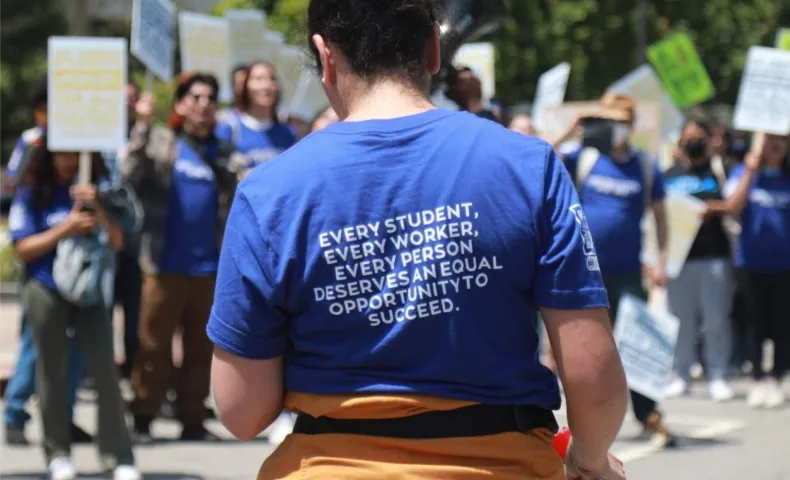 Photo Credit: UCLA Labor Center
Photo Credit: UCLA Labor Center
A Pathway to Opportunity Beyond DACA
Jenny Kim graduated from UC Irvine in 2020 and will enroll in the fall in UCLA’s Master of Public Policy program. But Kim’s path through college and her journey to a secure and stable life and career have been complicated by one salient fact: she is undocumented and is not eligible for a work permit and deportation relief under the Deferred Action for Childhood Arrivals (DACA) program.
Kim is far from alone. Current DACA participants represent only half of the estimated 1.2 million eligible young people who meet the program’s requirements. The primary reason: legal challenges to the program have put new DACA applications on hold. In addition, nearly 600,000 young people do not meet the eligibility requirements for the program because they came to the U.S. too recently.
Seeking to close these gaps, undocumented students and top national legal scholars recently launched a campaign to help more young people find dignity and hope. Under the banner of the Opportunity for All campaign, they have been urging the University of California (UC) system to provide work authorization and hire undocumented students without DACA for campus jobs and careers.
Opportunity for All is based on a legal theory that students and other workers do not need federal work authorization in order to access a job. Given that DACA was always envisioned as only a temporary solution to the challenges facing undocumented young people, the campaign offers a practical and innovative model for expanding access to employment for millions of people across the country.
As a volunteer with the Dream Resource Center at UCLA, Kim has become a leader in the Opportunity for All campaign. “Currently, lots of undocumented college students are unjustly barred from getting jobs on campus, and that creates huge barriers for me and so many others when we are trying to find work to help cover the costs of tuition, school supplies, and housing,” she said. Not only is the lack of campus job opportunities affecting the long-term success of current college and university students like Kim, but it is also keeping diverse students from immigrant families from enrolling in the first place.
Undaunted and Unafraid
Together with a network of other students on UC campuses across the state, Kim has been organizing and mobilizing peers to share their stories as part of the Opportunity for All campaign. The students’ efforts hit a snag when the regents of the UC system voted in January to suspend their consideration of the proposal to hire undocumented students without DACA protections. But Kim and the other student organizers remain undaunted. They are currently backing a state law that would allow the UC, California State University, and California Community Colleges systems to provide paid campus jobs for undocumented students. And, they are making a powerful case for other institutions in California and across the country—from higher education to local and state governments to nonprofits—to consider how they too can potentially provide opportunities for undocumented young people to find well-paying, stable jobs.
Ju Hong, director of the UCLA Dream Resource Center, said the way undocumented students have rallied in support of the Opportunity for All campaign reminds him of the origins of the “Dreamer” movement more than a decade ago. As an undergraduate at UC Berkeley at the time, Hong was a leader in the campaign to lift up undocumented students’ stories and the challenges they faced in going to college and finding their way to family-supporting careers. Supported by the Haas, Jr. Fund and other funders, it was a campaign that helped lead to the federal government’s adoption of DACA in 2012.
Today, Hong is director of the UCLA Dream Resource Center, which is administered by the UCLA Labor Center, a leading partner in the statewide Opportunity for All campaign. As a DACA recipient, Hong said he is inspired by how students have come together on behalf of the campaign.
“There really isn’t a lot of infrastructure in place right now for undocumented students to organize and share their stories, so it's been empowering to see this campaign come together around some very real, tangible, and practical protections for students who do not have DACA,” he said. Hong pointed to student mobilizations, vigils, and other actions aimed at urging the UC regents to adopt the measure, as well as ongoing organizing on campuses around the state.
A Fight to Be Recognized
Another student leader in the Opportunity for All campaign is Leo Rodriguez, who graduated from UC Berkeley this spring and is a former student representative on the board of the California Student Aid Commission. Rodriguez, who has DACA status, said work authorization like that afforded by Opportunity for All is important for all undocumented students, regardless of whether or not they have DACA protections. Given how DACA is facing serious legal challenges and is constantly subject to political attacks, Rodriguez said it’s time to embrace other ways to provide undocumented young people in the United States with dignity, security, and opportunity.
“At the core of this work is the idea that we are fighting to be recognized and to advance ourselves as human beings,” Rodriguez said. “This is about students stepping into their power and their voice and asking for a better life.”
Rodriguez said his work with the Undocumented Student-Led Network, a UC-wide coalition of students working to advance Opportunity for All, has been an energizing experience. “As an undocumented person, sometimes you feel you are fighting your battles alone,” he said. “But this work has connected me to a statewide network of students who are experiencing the same dehumanization and the same frustrations I am facing. And to see all these people come together is a powerful thing to see.”
UC Irvine graduate Jenny Kim agreed that the Opportunity for All campaign has helped surface broad support for new legal pathways to jobs among undocumented students and allies across the state. “We’re seeing a lot of excitement from students. It’s been a real platform for immigrant youth to share our stories and build our power and strengthen our community in ways that weren’t really happening before,” Kim said.
Supporting Student Leadership
As she plans to commence her master’s studies at UCLA in the fall, Kim said she looks forward to the possibility of finding campus jobs that would provide her and other undocumented students with more financial security. She urged funders to do more to support immigrant youth organizing so that more undocumented students can find their way to opportunities and justice.
Ju Hong shared the same message for philanthropy, making the case that undocumented young people and others who are directly affected by issues from poverty to injustice must be at the forefront of movements for change. He called on funders to support a range of strategies for supporting youth organizing, from leadership development and policy advocacy to strategic communications.
“We’ve seen it many times before,” Hong said, citing the organizing that led to the California DREAM Act, DACA, health care coverage for undocumented residents in California, and driver’s licenses for undocumented immigrants in the state. “When funders invest in young people and youth organizing, and when they help us lift our stories and shift the public mindset, anything can happen.”
The Opportunity for All Campaign is a coalition of the Undocumented Student-led Network (USN), the Center for Immigration Law and Policy (CILP) at the UCLA School of Law, and the UCLA Labor Center.
